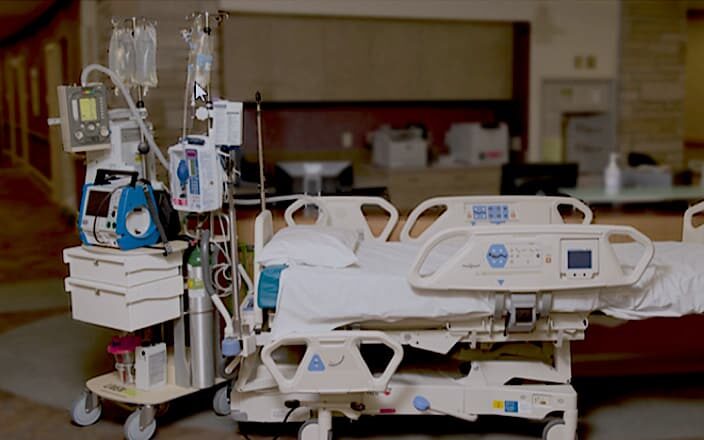Corona Update: SURGE CAPACITY SOLUTIONS – The mobi is a mobile headwall (equipment consolidator) that can be set up in any space that has an electrical outlet: next to a chair, a bed, a cot in a hallway, a cafeteria, or anywhere patients need to be located. Click here for more information.
Early Patient Mobility Blog
Preparing For Hospital Overflow

Preparing For Hospital Overflow
May 4, 2021
Are Hospitals Ready for the Coronavirus?
Hospital Overflow Crisis: On January 30, 2020, the World Health Organization declared the outbreak of the coronavirus (“COVID-19”) a “public health emergency of international concern;”1 a few weeks later, the Center for Disease Control & Prevention announced that “at some point, widespread transmission of COVID-19 in the United States will occur,” warning that “public health and healthcare systems may become overloaded, with elevated rates of hospitalizations and deaths,” and that emergency medical services, healthcare providers, and hospitals “may be overwhelmed.”1 Three weeks after the introduction of the coronavirus, hospitals in Italy are operating at 200% patient capacity, and Giulio Gallera, the top health official in Lombardy describes the search for more acute care beds as a “race against time.”2 In the US, the medical director Dr. John Hick echoes this warning, saying that: “People don’t understand how close the health system runs to capacity every day. We just don’t have the trained staff to staff much beyond what we have now. Patients are waiting in the emergency department in many cities on a routine basis. Then you talk about adding a pandemic onto that? There are going to be compromises.” So, what creative options are available for maximizing existing hospital space?
PART I: Preparing for Hospital overflow
Hospital Overflow Solution: The mobi is an equipment consolidator that can be set up in any space that has an electrical outlet: next to a chair, a bed, a cot in the hallway, a cafeteria, or anywhere patients need to be located, allowing for monitors, ventilators, pumps, and IV poles to be continually with the patient.
Key Facts:
- 10% of the patients who test positive for coronavirus must be admitted to intensive-care units.3
- According to the American Hospital Association, since 1975, the improvements in medical practice, pharmaceuticals, and outpatient options (as well as pressure from insurance companies) have steadily reduced the number of both hospitals (12%) and hospital beds (16%). This system of consolidation and emphasis on outpatient treatment has limited the hospital system’s ability to accommodate for surges in demand. Many developed countries have 5.4 hospital beds available for every 1,000 patients. In the US, the number is 2.8.7
- Only a small minority of US states have a formal protocol in place for dealing with a large-scale medical emergency. The existing plans are designed to maximize existing space by putting patients in doubled-up rooms, conference rooms, and any other unused spaces. 4
- According to the Centers for Medicare and Medicaid Services, coronavirus patients who do not require intubation can be safely isolated in a typical room, rather than a “negative pressure room.” Jane Englebright, CEO of HCA Healthcare Inc. has asked hospital staff to look for any space that might be modified for patient use, including storage closets and previously closed buildings. Cleveland Clinic has responded by planning to shift more than 1,000 non-coronavirus patients to nearby hotel rooms. Crews at Providence hospitals are building new isolation rooms with portable equipment: “It looks like MacGyver has been working in our hospitals…We have fans and filters and holes that have been filled up through any means necessary. Duct tape solves a lot of problems.”7
- Even severe flu seasons have been known to stretch hospital resources, to the point where tents must be set up in parking lots and patients are held in emergency rooms for days. Dr. James Lawler estimates that coronavirus is likely to cause 5-10 times the burden of influenza, urging hospitals to “get prepared to take care of a heck of a lot of people.” Dr. Lawler estimates that 96 million people could be infected; assuming a 5% hospitalization rate, at least 2 million people would require intensive care and 1 million would require ventilators. 5
Click here for the full article
Learn more about Livengood Medical Mobi Solutions.
What Customers Say
Testimonials
Contact Us Now to Talk to a
Mobi Ambulation Specialist
#502
Fort Collins, Co 80525
United States
mobi Patient Mobility
sales@livengoodmed.com









